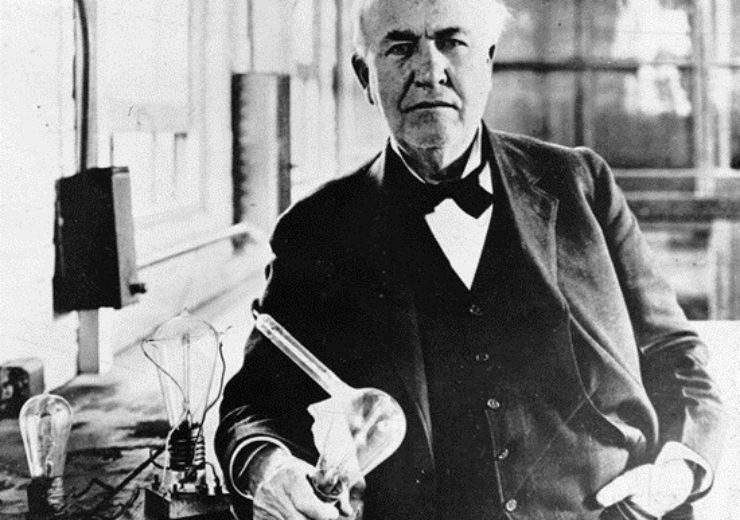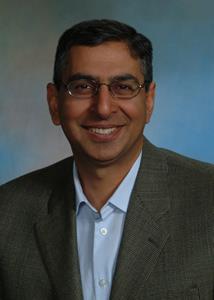Here we analyse ten 2019 technology predictions, with everything from automation in the public sector to GDPR's increased importance on the agenda for this year

Thomas Edison's lightbulb was one of the most iconic technological innovations of the past few centuries
One thing you can rely on at this time of year as much as an influx of new members at your gym is an avalanche of 2019 technology predictions – but we’ve sifted through the litany of lists to compile some of the more original ideas.
From unmanned shops to even more remote working, here we gather the thoughts of senior executives from various industries and profile the ways in which tech will impact the business world this year.
2019 technology predictions
Public sector to lead AI and automation
Terry Walby, CEO and founder of workplace automation company Thoughtonomy
We’ve already seen the benefits that intelligent automation is bringing to public services.
As budgetary pressures become ever more severe, skills become in even shorter supply (post-Brexit) and demand continues to increase, there will be a marked shift towards digital labour as a way to drive efficiency and free up time among frontline staff.

We expect to see public sector organisations operating a higher virtual worker-to-employee ratio than any other sectors.
No longer the laggards, automation will see the public sector become pioneers within AI adoption.
The arrival of ambient commerce
Cyrus Mewawalla, head of thematic research at market intelligence firm GlobalData
Retailers will use more cameras to track shoppers and a host of computer algorithms to analyse and predict their behaviour and make their shopping experience more efficient.
China is pioneering the development of automated and unmanned walk-in stores carrying up to 500 grocery items based on smartphones, scanning and automatic payment.
These are smart, connected halfway houses between convenience stores and kiosks.
They will be autonomous mobile units able to service rural areas as well as city outskirts, especially as city infrastructures become smarter.
Data sharing in the transport sector
Mark Holt, chief technology officer at Trainline
In 2019, one of the key trends we will see in travel technology will be improved data sharing between organisations.
Expect to see transport operators, technology companies, online retailers and Government all coming together and working closely to share useful data and information with one another.
This will be key to breaking down silos and bringing the transport industry closer together to further improve the overall travel experience for passengers.

In the UK, the Joint Rail Data Action Plan – announced earlier this year – is a government initiative specifically addressing data sharing in train travel.
The plan means operators are encouraged to share more detailed information – for example exact GPS locations on trains – which the industry can use to build innovations and keep customers better informed.
We’re huge champions of these better data sharing practices at Trainline, and recently opened up our data in France to Etalab – the French government’s data portal – to provide other companies with more useful data to build AI innovations upon.
Hybrid ‘marketing security’ teams
Ian Woolley, chief revenue officer at customer data tracking platform Ensighten
As many website hacks have highlighted in 2018, one of the core causes is problems with third-party technologies.
Via chat boxes, form fill and unapproved third party tags on a website, criminals can gain access to customer data sometimes even without the organisation’s knowledge.

The challenge is that marketers are generally in charge of this data but haven’t necessarily been accountable for the protection and security of this data.
In 2019, businesses will view security more holistically.
To do this, companies will look to bring more senior security talent in-house to navigate the new data landscape and regain control, rather than outsourcing security to multiple vendors.
But this will squeeze an already limited pool of skilled professionals.
With a lack of talent available, we will likely also see a shift in the role of the marketing team – businesses will put more onus and investment in upskilling marketers so that they have a marketing security remit.
At a more senior level, we’ll see the chief marketing officer and chief information security officer start to work more closely to mitigate security vulnerabilities.
GDPR to come to the fore
Ciaran Dynes, senior vice-president of products, at cloud integration company Talend
GDPR is going to be one to watch this year – there hasn’t really been a high-profile, big-name brand that’s breached its rules.
Nobody huge has been slammed with one of those multiple-million-euro fines we were warned about after it was announced so I think it hasn’t quite become the force it could be.

Obviously companies are doing what they can to be compliant, but once someone is hit with major fine I think we’ll see a big change in how everyone deals with data privacy.
It hasn’t happened yet, but when it does everyone’s going to take it much more seriously and it could really redefine business’ relationship with the public more powerfully than it has so far.
Europe to fall behind on 5G development
Nathan Rader, director of strategy at open-source software provider Canonical
European operators usually take the lead on new network developments (look at 2G, 3G, and 4G) but the opposite is true for 5G.
The difference in this case is that 4G harmonised all the networks in Europe, bringing the technology together to create a very dense and fast network.
When compared to America, where there’s only a cell tower every five to ten miles, the demand for a higher capacity network such as 5G is much greater than we see in Europe.
Likewise, with more remotely located homes, there is a more urgent need for 5G to support fixed broadband.
It’s the same case in China, if you compare it to the rest of Asia, for example.
This is why both regions are ahead of Europe when it comes to implementing 5G at scale.
Without the customer demand and overcapacity on existing networks, can telcos justify launching wide scale 5G across Europe?
Automation to boost cyber security
Neil Thacker, chief information security officer of cyber security firm Netskope
There will be a continued drive for automation across industries in 2019.
Automation, in the general sense, has been continuously a hot button topic in prediction reports over the last few years, but 2019 will see a focus on how it can simplify cloud security programmes.

We continually advance capabilities in automating secure configuration for IaaS (infrastructure-as-a-service), apply data and threat protection through machine learning anamoly detection for IaaS and SaaS (software-as-a-service) and assessing, through automation, reviewing the terms of service offered by cloud service providers.
Automation, wherever it is implemented, should always maintain security and privacy by default.
IoT to become intelligent
Atish Gude, chief strategy officer at hybrid cloud data services firm NetApp
Traditional Internet of Things (IoT) devices have been built around an inherent “phone home” paradigm: Collect data, send it for processing and wait for instructions.
But even with the advent of 5G networks, real-time decisions can’t wait for data to make the round trip to a cloud or data centre and back, plus the rate of data growth is increasing.

As a result, data processing will have to happen close to the consumer and this will intensify the demand for more data processing capabilities at the edge.
IoT devices and applications – with built-in services such as data analysis and data reduction – will get better, faster and smarter about deciding what data requires immediate action, what data gets sent home to the core or to the cloud and even what data can be discarded.
Desk phones to hang on another year
Gurdip Jande, vice-president of cloud product lifecycle management at telecoms firm Mitel
Despite the hunger for collaborative and innovative cloud solutions the death of the office phone is still far off. Adaption is a blocker for all technology.

The faster the industry moves, the harder it is for users to let go of products they’ve become accustomed to using for years.
It becomes, for the customer, a bit of a tradition to have a desk phone by their side and I don’t see that tradition being broken in 2019.
Millennials will want remote working
Mou Mukherjee, head of registry services at domain provider .Cloud
In 2019, more companies will change the way they work to improve employee productivity and retention, and attract new talent.
The demand for more flexible and collaborating working environments is on the rise. By 2025, it’s estimated that 75% of the workforce will be millennials, and 70% of that group will want to work remotely.

We’ve already seen in recent years more companies being open to new working environments.
The office of the old days is being replaced with modern and bright spaces that foster collaboration and creativity, to entirely distributed teams where a better set of digital and cloud-based tools come into play.
This year I think we can expect modern businesses and their employees to co-create even more modern ways of working.
Ones that will empower employees but also give companies the digital edge they need to succeed in today’s hyper-digital world.


